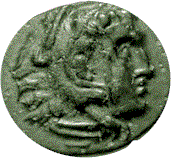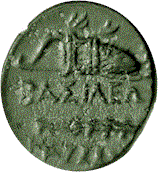Ambitious son of Antipater
whose efforts to succeed his father as ruler of Macedonia doomed
the family of Alexander
the Great. In 319
BCE the dying Antipater, who had been
caretaker of the homeland during the Alexander's conquest of
Asia (334-323
BCE) & regent for the royal family after Perdiccas'
defeat, entrusted the regency for Alexander's royal heirs to Polyperchon,
a fellow senior officer. As true loyal soldiers, both men
understood their offices as a mandate to serve the legitimate
ruling dynasty, not to try to usurp power & establish a
dynasty of their own. Though himself a ranking officer,
Cassander -- who was almost Alexander's exact contemporary --
lacked these old soldiers' sense of duty & code of honor.
True to Alexander's dying word, Cassander firmly believed that
the right of succession belonged "to the strongest" (kratistoi).
So, rather than respect his own father's dying act, he refused
to recognize Polyperchon's authority, expelled him from
Macedonia & claimed the regency for himself (317
BCE).
To try understand the
role that Cassander played in the history of Alexander's successors
fairly, one must keep in mind that he had long suffered in the
shadow of two stronger men: a stern father who did not trust his
own son's ability to take command & and a self-confident
monarch whose string of stunning victories only fed his growing
megalomania. When the former was summoned by the latter to
Babylon (324
BCE), he sent Cassander in his place. It was not
Antipater but his filial representative who had to bear the full
brunt of the wrath of an autocratic king not accustomed to
having his orders countermanded.
To make matters
worse, Cassander was totally unprepared for the spectacle that
confronted him when he arrived in Babylon. Having claimed
the throne of the Persian "King of kings" for himself,
Alexander had introduced the Persian custom of proskynesis
(full prostration in the presence of a master) into his court.
Witnessing this practice -- men flat on their face with their
butts in the air -- for the first time in his life, Cassander
broke into uncontrollable laughter. This outburst so enraged
Alexander that he grabbed the startled Cassander & bashed
his head into the wall. While the latter was not seriously
wounded physically by such a painful royal reception, his
subsequent actions prove that he bore the psychological scars of
this incident for the rest of his life. After this, Cassander
probably not only felt no guilt in defying his dead father's
last order but no regrets when he finally got the chance to
execute Alexander's closest relatives: both his mother (316
BCE)
& son (310
BCE).
But annihilation of
the Argead dynasty was not Cassander's initial intention.
Rather, when he first seized control of the Macedonian homeland
(317
BCE), he sought to use the royal family to solidify his
right to be de facto regent. With Polyperchon gone &
the nominal king -- Philip IV (Alexander's half-witted
half-brother) -- his compliant hostage, Cassander now felt secure enough
to complete the conquest of Greece, leaving Macedonia in the
hands of an early supporter: Philip's ambitious queen, Eurydice.
Polyperchon, however,
-- having found refuge with Alexander's 6 year old son in the
neighboring kingdom of Epirus (modern Albania) where he joined
forces with Alexander's mother (Olympias) -- took advantage of
Cassander's absence to launch a counter-attack. Confronted with
the forces of their own dowager queen & the legitimate son
of the legendary conqueror, the whole Macedonian defense
crumbled. King Philip was taken prisoner & ordered executed
by Olympias to guarantee that her grandson would be the sole
legal claimant to his father's throne.
Such an unanticipated
complete debacle must have convinced Cassander that as long as
any member of Alexander's bloodline was alive his own claim to
be the legitimate ruler of Macedonia could never be
secure. Having to reconquer his power base inclined him to
show no mercy to those who had tried to evict him. Trapped by
Cassander's superior forces, Olympias was executed almost as
soon as she was captured (316
BCE). Then, to
integrate
himself into the royal family, Cassander married
Alexander's half-sister, Thessalonica (the child of one of
Philip II's lesser wives). To celebrate this union he founded
the cities of Thessalonica & Cassandreia (316
BCE) just as
Macedonian rulers before him (Philip & Alexander) had
founded cities bearing their own names.
For the time
being, however, Cassander spared young Alexander IV, since --- with king
Philip dead -- physical custody of the 7 year old heir apparent
was his only hope of getting other Macedonians to grant his
claim to be royal regent, especially since the aged Polyperchon
(the prince's legal guardian) tried to undermine Cassander's
claim by transferring the regency to his powerful rival
Antigonus (315
BCE). As long as Antigonus pursued this claim,
the prince's life was secure. In 311
BCE, however, having
failed to defeat his challengers, Antigonus agreed to a détente
with Cassander & Ptolemy that recognized
their autonomy & relinquished any claim to be regent of a
unified Macedonian empire. Once that truce was formalized,
physical custody of the young Alexander -- who had just reached
puberty -- was not only unnecessary to secure Cassander's rule,
it increasingly jeopardized his position with each passing
year. For when the nominal king reached 18, he would no longer need a regent & as
Alexander's heir could win popular support to rule on his
own. After all, if the father had won the undying loyalty
of the Macedonian army despite his youth, so might his son. The
prospect of that scenario proved totally unacceptable to
Cassander, who had spent almost a decade trying to secure his own
right to rule Macedonia. So, rather than wait for the
prince to mature further, Cassander ordered the execution of
both him & his mother (310
BCE).
Although the
Macedonian throne was now vacant for the first time in three
centuries, Cassander -- whose own right to rule had been formally
recognized by other senior Macedonian rulers -- still did not
initially claim to be king. When Antigonus presumed to
adopt that title for himself (306
BCE), however, & other regional
rulers followed suit, Cassander finally
decided it was safe to don the diadem (305
BCE).
Yet the extent of
Cassander's Macedonian kingdom had been greatly reduced. As a calculated symbolic
gesture of a new era in Macedonian-Greek relations, he had
ordered the rebuilding of Thebes, which Alexander had razed when
he became king. But Polyperchon's strategy of promising full
autonomy to Greek city states -- which was echoed by Antigonus,
Ptolemy & other rulers -- cost Cassander control of much of
the rest of Greece & eventually ended any chance of him
establishing a dynasty of his own. Though he retained
control of Macedonia & Epirus until his death, he
was effectively isolated. Other Macedonian rulers (Lysimachus
& Seleucus)
benefited from Antigonus' defeat (301
BCE) by dividing his Asian
domains between them. This led Antigonus' vigorous son, Demetrius
Poliorcetes, to seize control of Greece & use it as a base
for the conquest of Macedonia (394
BCE), just three years after
Cassander's death.
References:
Josephus,
Antiquities
12.2.
Diodorus of Sicily,
Historical
Library 18-20.
Justin,
Epitome of Trogus' Philippic History 14-15.
Pausanias,
Description
of Greece
1.6.4, 7; 11.4-5.
Other resources on
line:
![]()
![]()


![]()
![]()
![]() Perspective on the
World of Jesus
Perspective on the
World of Jesus ![]()